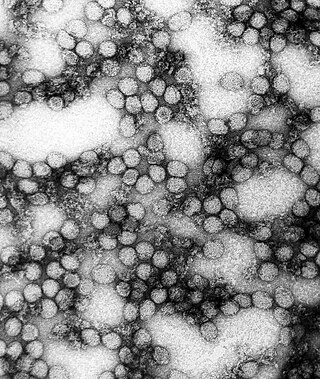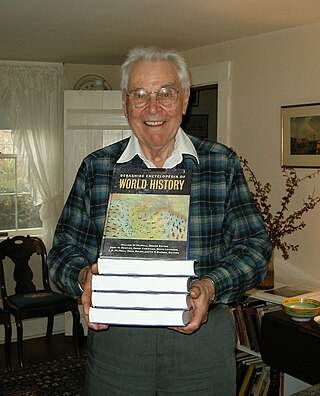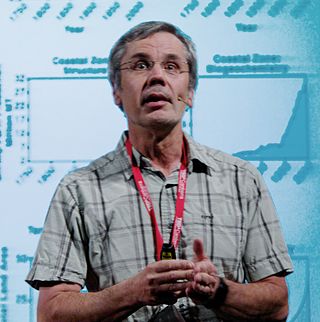
The Holocene extinction, or Anthropocene extinction, is the ongoing extinction event during the Holocene epoch. The extinctions span numerous families of plants and animals, including mammals, birds, reptiles, amphibians, fish, invertebrates, and affecting not just terrestrial species but also large sectors of marine life. With widespread degradation of biodiversity hotspots, such as coral reefs and rainforests, as well as other areas, the vast majority of these extinctions are thought to be undocumented, as the species are undiscovered at the time of their extinction, which goes unrecorded. The current rate of extinction of species is estimated at 100 to 1,000 times higher than natural background extinction rates, and is increasing.

Yellow fever is a viral disease of typically short duration. In most cases, symptoms include fever, chills, loss of appetite, nausea, muscle pains – particularly in the back – and headaches. Symptoms typically improve within five days. In about 15% of people, within a day of improving the fever comes back, abdominal pain occurs, and liver damage begins causing yellow skin. If this occurs, the risk of bleeding and kidney problems is increased.

Human ecology is an interdisciplinary and transdisciplinary study of the relationship between humans and their natural, social, and built environments. The philosophy and study of human ecology has a diffuse history with advancements in ecology, geography, sociology, psychology, anthropology, zoology, epidemiology, public health, and home economics, among others.

Carolyn Merchant is an American ecofeminist philosopher and historian of science most famous for her theory on The Death of Nature, whereby she identifies the Scientific Revolution of the seventeenth century as the period when science began to atomize, objectify, and dissect nature, foretelling its eventual conception as composed of inert atomic particles. Her works are important in the development of environmental history and the history of science. She is Distinguished Professor Emerita of Environmental History, Philosophy, and Ethics at UC Berkeley.
The Anthropocene is a proposed geological epoch dating from the commencement of significant human impact on Earth's geology and ecosystems, including, but not limited to, anthropogenic climate change.
Malaria has had a significant impact on the history of the Caribbean, due to its effects on the colonization of the islands and the corresponding impact on society and economy.

Paul Jozef Crutzen was a Dutch meteorologist and atmospheric chemist. He was awarded the Nobel Prize in Chemistry in 1995 for his work on atmospheric chemistry and specifically for his efforts in studying the formation and decomposition of atmospheric ozone. In addition to studying the ozone layer and climate change, he popularized the term Anthropocene to describe a proposed new epoch in the Quaternary period when human actions have a drastic effect on the Earth. He was also amongst the first few scientists to introduce the idea of a nuclear winter to describe the potential climatic effects stemming from large-scale atmospheric pollution including smoke from forest fires, industrial exhausts, and other sources like oil fires.
The Albert J. Beveridge Award is awarded by the American Historical Association (AHA) for the best English-language book on American history from 1492 to the present. It was established on a biennial basis in 1939 in memory of United States Senator Albert J. Beveridge (1862-1927) of Indiana, former secretary and longtime member of the Association, through a gift from his wife, Catherine Eddy Beveridge and donations from AHA members from his home state. The award has been given annually since 1945.

Environmental history is the study of human interaction with the natural world over time, emphasising the active role nature plays in influencing human affairs and vice versa.

Antonio Stoppani was an Italian Catholic priest, patriot, geologist and palaeontologist. He studied the geology of the Italian region and wrote a popular treatise, Il Bel Paese, on geology and natural history. He was among the first to propose a geological epoch dominated by human activities that altered the shape of the land.
This timeline lists events in the external environment that have influenced events in human history. This timeline is for use with the article on environmental determinism. For the history of humanity's influence on the environment, and humanity's perspective on this influence, see timeline of history of environmentalism. See List of periods and events in climate history for a timeline list focused on climate.

William Hardy McNeill was an American historian and author, noted for his argument that contact and exchange among civilizations is what drives human history forward, first postulated in The Rise of the West (1963). He was the Robert A. Millikan Distinguished Service Professor Emeritus of History at the University of Chicago, where he taught from 1947 until his retirement in 1987.
The Early Anthropocene Hypothesis is a stance concerning the beginning of the Anthropocene first proposed by William Ruddiman in 2003. It posits that the Anthropocene, a proposed geological epoch coinciding with the most recent period in Earth's history when the activities of the human race first began to have a significant global impact on Earth's climate and ecosystems, did not begin during European colonization of the Americas, as numerous scholars posit, nor the eighteenth century with advent of coal-burning factories and power plants of the industrial era, as originally argued by Paul Crutzen, nor in the 1950s as claimed by the Anthropocene Working Group, but dates back to 8,000 years ago, triggered by intense farming activities after agriculture became widespread. It was at that time that atmospheric greenhouse gas concentrations stopped following the periodic pattern of rises and falls that had accurately characterized their past long-term behavior, a pattern that is explained by natural variations in Earth's orbit known as Milankovitch cycles.

Andrew C. Revkin is an American science and environmental journalist, author and educator. He has written on a wide range of subjects including destruction of the Amazon rain forest, the 2004 Asian tsunami, sustainable development, climate change, and the changing environment around the North Pole. He is the founding director of the Initiative on Communication and Sustainability at The Earth Institute of Columbia University.

Planetary boundaries is a concept highlighting human-caused perturbations of Earth systems making them relevant in a way not accommodated by the environmental boundaries separating the three ages within the Holocene epoch. Crossing a planetary boundary comes at the risk of abrupt environmental change. The framework is based on scientific evidence that human actions, especially those of industrialized societies since the Industrial Revolution, have become the main driver of global environmental change. According to the framework, "transgressing one or more planetary boundaries may be deleterious or even catastrophic due to the risk of crossing thresholds that will trigger non-linear, abrupt environmental change within continental-scale to planetary-scale systems."

William Lee Steffen was an American-born Australian chemist. He was the executive director of the Australian National University (ANU) Climate Change Institute and a member of the Australian Climate Commission until its dissolution in September 2013. From 1998 to 2004, he was the executive director of the International Geosphere-Biosphere Programme, a coordinating body of national environmental change organisations based in Stockholm. Steffen was one of the founding climate councillors of the Climate Council, with whom he frequently co-authored reports, and spoke in the media on issues relating to climate change and renewable energy.
Eugene F. Stoermer was a leading researcher in diatoms, with a special emphasis on freshwater species of the North American Great Lakes. He was a professor of biology at the University of Michigan School of Natural Resources and Environment.
The Great Acceleration is the dramatic, continuous and roughly simultaneous surge across a large range of measures of human activity, first recorded in the mid-20th century and continuing to this day. Within the concept of the proposed epoch of the anthropocene, these measures are specifically those of humanity's impact on Earth's geology and its ecosystems. In the concept, the Great Acceleration can be variously classified as the only age of the epoch to date, one of many ages of the epoch – depending on the epoch's proposed start date – or a defining feature of the epoch that is thus not an age, as well as other classifications.
The Anthropocene Working Group (AWG) is an interdisciplinary research group dedicated to the study of the Anthropocene as a geological time unit. It was established in 2009 as part of the Subcommission on Quaternary Stratigraphy (SQS), a constituent body of the International Commission on Stratigraphy (ICS). As of 2021, the research group features 37 members, with the physical geographer Simon Turner as Secretary and the geologist Colin Neil Waters as Chair of the group. The late Nobel Prize-winning Paul Crutzen, who popularized the word 'Anthropocene' in 2000, had also been a member of the group until he died on January 28, 2021. The main goal of the AWG is providing scientific evidence robust enough for the Anthropocene to be formally ratified by the International Union of Geological Sciences (IUGS) as an Epoch within the Geologic time scale.

The environmental history of Latin America has become the focus of a number of scholars, starting in the later years of the twentieth century. But historians earlier than that recognized that the environment played a major role in the region's history. Environmental history more generally has developed as a specialized, yet broad and diverse field. According to one assessment of the field, scholars have mainly been concerned with "three categories of research: colonialism, capitalism, and conservation" and the analysis focuses on narratives of environmental decline. There are several currents within the field. One examines humans within particular ecosystems; another concerns humans’ cultural relationship with nature; and environmental politics and policy. General topics that scholars examine are forestry and deforestation; rural landscapes, especially agro-export industries and ranching; conservation of the environment through protected zones, such as parks and preserves; water issues including irrigation, drought, flooding and its control through dams, urban water supply, use, and waste water. The field often classifies research by geographically, temporally, and thematically. Much of the environmental history of Latin America focuses on the nineteenth and twentieth centuries, but there is a growing body of research on the first three centuries (1500-1800) of European impact. As the field established itself as a more defined academic pursuit, the journal Environmental History was founded in 1996, as a joint venture of the Forest History Society and the American Society for Environmental History (ASEH). The Latin American and Caribbean Society for Environmental History (SOLCHA) formed in 2004. Standard reference works for Latin American now include a section on environmental history.











